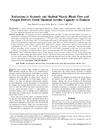Please use this identifier to cite or link to this item:
https://accedacris.ulpgc.es/jspui/handle/10553/6519
| Title: | Reductions in systemic and skeletal muscle blood flow and oxygen delivery limit maximal aerobic capacity in humans | Authors: | González-Alonso, J. Calbet, JAL |
UNESCO Clasification: | 241106 Fisiología del ejercicio | Keywords: | Cardiac output Exercise Fatigue |
Issue Date: | 2003 | Journal: | Circulation (New York, N.Y.) | Abstract: | BACKGROUND: A classic, unresolved physiological question is whether central cardiorespiratory and/or local skeletal muscle circulatory factors limit maximal aerobic capacity (VO2max) in humans. Severe heat stress drastically reduces VO2max, but the mechanisms have never been studied. METHODS AND RESULTS: To determine the main contributing factor that limits VO2max with and without heat stress, we measured hemodynamics in 8 healthy males performing intense upright cycling exercise until exhaustion starting with either high or normal skin and core temperatures (+10 degrees C and +1 degrees C). Heat stress reduced VO2max, 2-legged VO2, and time to fatigue by 0.4+/-0.1 L/min (8%), 0.5+/-0.2 L/min (11%), and 2.2+/-0.4 minutes (28%), respectively (all P<0.05), despite heart rate and core temperature reaching similar peak values. However, before exhaustion in both heat stress and normal conditions, cardiac output, leg blood flow, mean arterial pressure, and systemic and leg O2 delivery declined significantly (all 5% to 11%, P<0.05), yet arterial O2 content and leg vascular conductance remained unchanged. Despite increasing leg O2 extraction, leg VO2 declined 5% to 6% before exhaustion in both heat stress and normal conditions, accompanied by enhanced muscle lactate accumulation and ATP and creatine phosphate hydrolysis. CONCLUSIONS: These results demonstrate that in trained humans, severe heat stress reduces VO2max by accelerating the declines in cardiac output and mean arterial pressure that lead to decrements in exercising muscle blood flow, O2 delivery, and O2 uptake. Furthermore, the impaired systemic and skeletal muscle aerobic capacity that precedes fatigue with or without heat stress is largely related to the failure of the heart to maintain cardiac output and O2 delivery to locomotive muscle. | URI: | https://accedacris.ulpgc.es/handle/10553/6519 | ISSN: | 0009-7322 | DOI: | 10.1161/01.CIR.0000049746.29175.3F | Source: | Circulation[ISSN 0009-7322],v. 107 (6), p. 824-830 |
| Appears in Collections: | Artículos |
Show full item record
SCOPUSTM
Citations
305
checked on Jun 8, 2025
WEB OF SCIENCETM
Citations
273
checked on Jun 8, 2025
Page view(s)
71
checked on Feb 17, 2024
Download(s)
91
checked on Feb 17, 2024
Google ScholarTM
Check
Altmetric
Share
Export metadata
This item is licensed under a Creative Commons License

